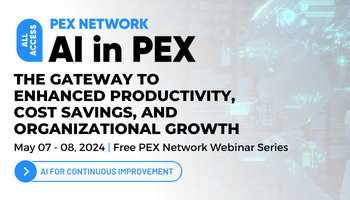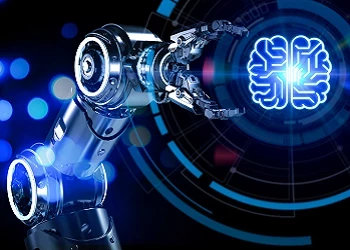5 hot takes on AI and intelligent automation
Leaders from Microsoft, VistaPrint, Novomatic AG and AECOM discuss artificial intelligence and intelligent automation
Add bookmark
Artificial intelligence (IA) and intelligent automation (IA) are two of the hottest topics in the modern business landscape right now. Both offer diverse opportunities for improving business processes, enhancing operational excellence and aiding digital transformation.
In June, the Artificial Intelligence and Intelligent Automation (AIIA) conference returns for its eighth edition. Held in Frankfurt, Germany, the summit will welcome a raft of business and thought leaders to discuss some of the biggest AI and IA trends today – from enabling autonomous enterprises and value creation to generative AI and data-driven decision making.
Don't miss any news, updates or insider tips from PEX Network by getting them delivered to your inbox. Sign up to our newsletter and join our community of experts.
Here are five hot takes on AI and IA from some of the leaders who will be speaking at the event.
1. Build versus buy decisions are tied to business vision
 Organizations must decide whether to build or buy AI solutions, with business vision key to making the right choices, says Sonika Kapil, AI and app chief architect at Microsoft. “There has to be a vision and a strategy team to follow through with the vision. Without this, you’re just ‘trying tech’ but not deriving business value from it.” After that, you need to establish what the business use cases are, Kapil adds. Then it’s time to decide whether you can go out and buy what you need based on the implementation effort, or if you have the skills to build it, she says. “If it’s an experience thing [e.g. the best call center ever], you need to build it. If it’s a first-party product – for example, making developers more productive – you can buy it.” Your budget and the skills you have in the organization are very important in these decisions, Kapil says.
Organizations must decide whether to build or buy AI solutions, with business vision key to making the right choices, says Sonika Kapil, AI and app chief architect at Microsoft. “There has to be a vision and a strategy team to follow through with the vision. Without this, you’re just ‘trying tech’ but not deriving business value from it.” After that, you need to establish what the business use cases are, Kapil adds. Then it’s time to decide whether you can go out and buy what you need based on the implementation effort, or if you have the skills to build it, she says. “If it’s an experience thing [e.g. the best call center ever], you need to build it. If it’s a first-party product – for example, making developers more productive – you can buy it.” Your budget and the skills you have in the organization are very important in these decisions, Kapil says.
READ: What is intelligent automation?
2. Culture and mindset are key challenges of automation and transformation
 Culture and mindset are the biggest challenges of automation and transformation endeavors, says Dr Jannik Podlesny, principal engineering at VistaPrint. “It comes down to individuals – that they understand why we are doing this, and they come along for the journey.” If you look at statistics and reports about why transformation and automation fail, it’s often because of people not buying into and blocking efforts, he adds. “For us, a core element [of manufacturing automation] has been to take along the people, take away their fear and shape this together.”
Culture and mindset are the biggest challenges of automation and transformation endeavors, says Dr Jannik Podlesny, principal engineering at VistaPrint. “It comes down to individuals – that they understand why we are doing this, and they come along for the journey.” If you look at statistics and reports about why transformation and automation fail, it’s often because of people not buying into and blocking efforts, he adds. “For us, a core element [of manufacturing automation] has been to take along the people, take away their fear and shape this together.”
READ: 7 trends shaping intelligent automation in 2024
3. Generative AI won’t completely disrupt processes
 A common question today is whether generative AI will augment existing processes or disrupt them completely. When you start leveraging generative AI in your processes it might seem, from an external perspective, that not much changes because the inputs and outputs stay the same, says Dr Bogdan Pirvu, head of data and analytics at Novomatic AG. “If a process is truly necessary to achieve a goal, it will not go away in the sense that you will still need the inputs of that process in order to generate the outputs.”
A common question today is whether generative AI will augment existing processes or disrupt them completely. When you start leveraging generative AI in your processes it might seem, from an external perspective, that not much changes because the inputs and outputs stay the same, says Dr Bogdan Pirvu, head of data and analytics at Novomatic AG. “If a process is truly necessary to achieve a goal, it will not go away in the sense that you will still need the inputs of that process in order to generate the outputs.”
On the other hand, what changes radically is the internal execution of the process – for example when you remove all human involvement. “Of course, the speed and cost are also dramatically reduced. I guess it’s up to interpretation if that means the process is completely disrupted...pick your definition.”
4. Human customer support agents will be replaced by AI
The replacement of human front-line customer support agents with email, chat and voice bots is the most obvious future trend in the use of generative AI and its application in automation, Pirvu says. “Klarna recently replaced 700 full-time agents with an AI-based email system. In particular, first level support is typically generic enough to be a good target for machine learning-based automation.”
Call centers are ready for disruption, agrees Kapil. “There’s a lot which is possible,” and you can achieve a lot with call center automation, she adds.
REGISTER: All Access: Intelligent Automation 2024
5. Traditional automation struggles to adapt in modern business scenarios
 Business landscapes are no longer static, with customer expectations, regulations and data streams constantly evolving. Traditional automaton struggles to adapt, leading to inefficiencies, according to Cristina Duta, director of IA, global business services at AECOM. “Whenever we look at generative AI, with its adaptive algorithms that can learn from new data and situations, we are continuously refining automation for optimal performance.” It is not about automating processes with generative AI, it’s more about empowering them with intelligence and adaptability, she adds.
Business landscapes are no longer static, with customer expectations, regulations and data streams constantly evolving. Traditional automaton struggles to adapt, leading to inefficiencies, according to Cristina Duta, director of IA, global business services at AECOM. “Whenever we look at generative AI, with its adaptive algorithms that can learn from new data and situations, we are continuously refining automation for optimal performance.” It is not about automating processes with generative AI, it’s more about empowering them with intelligence and adaptability, she adds.
With generative AI, autonomous solutions will be able to think, learn and adapt like humans do, Duta says. In general, autonomous solutions are programmed for specific tasks and processes; generative AI is able to break free from that rigidity through continuous learning, she adds.
The Gateway to Enhanced Productivity, Cost Savings, and Organizational Growth

PEX Network's All Access AI in PEX series will show you how to use this bleeding-edge technology to improve your business performance and process excellence. You will learn from leading experts in the sector and discover the latest solutions and best practices for operational excellence and digital transformation. Register now and get access to this free PEX Network webinar series.
Register Now









